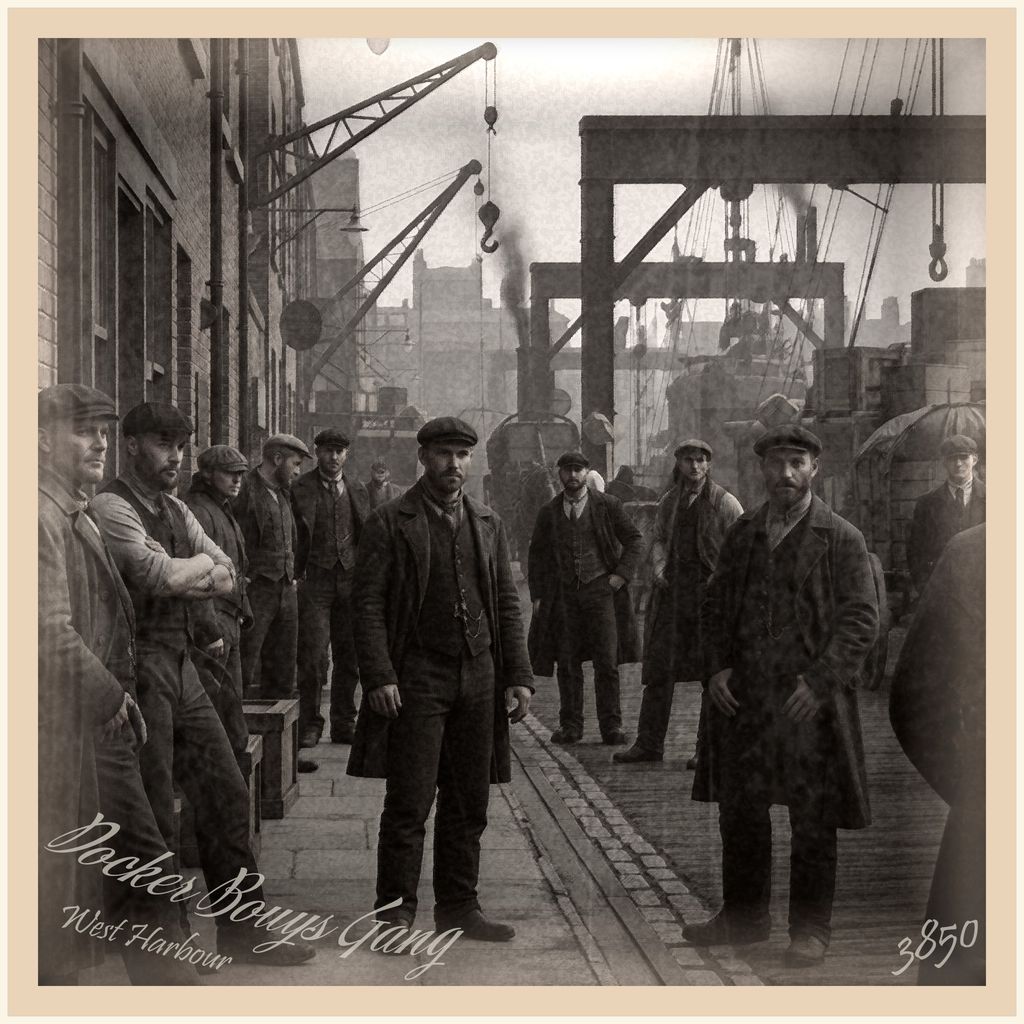
The Steel Grip of the Western Harbor
The Docker Boys are more than mere gang; they are the very sinew and shadow of Edenlon’s West Harbor District, an undisputed force that, for three decades since The Long War, has imposed its own brutal order where official authority has faltered. Under the iron but pragmatic hand of Kornelius Spots, the Docker Boys have sculpted chaos into an organized system, becoming both a terror and an undeniable point of reference for the denizens of the docks.

The Docker Boys gang clawed its way into existence from the ashes of post-war anarchy. With the collapse of state structures and the encroaching grip of poverty, the West Harbour festered, a breeding ground for petty crime and desperate factions. It was within this crucible that Cornelius Spots, wielding his cunning, ruthlessness, and innate leadership, began to knit these disparate elements into a cohesive whole. The name “Docker Boys” is a deliberate nod to their roots—they are men of the dock, intimately familiar with its intricate mechanisms and brutal realities. The gang absorbed smaller groups, crushing resistance and imposing its will until it emerged as the dominant force.
The Docker Boys wield almost complete control over the West Harbour District and a significant portion of the Old Capitol. Smuggling and illicit trade form the very bedrock of their enterprise; they command the flow of goods officially forbidden entry into Fergeria—from luxurious commodities smuggled from Alledia to banned substances and even steam engine parts, a rare and coveted commodity on the official market. To facilitate this, they possess an extensive network of contacts amongst sailors, shippers, and corrupt officials. Beyond this, they offer “protection,” or rather a racket, to local shops, warehouses, and businesses. Those who refuse to pay are swiftly informed of the consequences, which can range from “accidental” fires to wanton property destruction. For many, however, this is a grim necessity, providing a semblance of security in uncertain times.
Nothing enters or leaves the port without the explicit knowledge and consent of the Docker Boys, as they command the loading and unloading docks, dictating the order of work and the rates of fees, thus wielding immense influence over all local trade. They also extend their reach through “unofficial services,” resolving problems beyond the reach of the legal system by recovering stolen goods, collecting debts, and even arbitrating disputes between those dwelling by the docks. Through these services, they earn a brutal, yet undeniable, respect. Their network of informants is vast and extraordinarily effective, unearthing information that eludes official services—whispers, public sentiment, troop movements, and the planned activities of rival gangs; it is this crucial intelligence that underpins their survival and success.
The image of the Docker Boys is a potent blend of fear and pragmatic respect. They are renowned for their ruthlessness and effectiveness. Their presence within the docks is almost ubiquitous, and their symbols—often a stylized anchor or a cog—appear in unexpected places.
The gang typically wears dark, utilitarian clothing that allows them to seamlessly blend into the bustling crowd of dock workers. They are distinguished by their sturdy, mechanical accessories—modified keys, heavy chains, and sometimes even improvised steam weapons. They do not shy away from a fight; on the contrary, they are known for their willingness to engage in brutal confrontations, and their hand-to-hand combat skills, honed by iron fists and an intimate knowledge of the port’s terrain, render them formidable opponents.
The Docker Boys are a force that indelibly shaped the face of post-war West Harbor District. They stand as living proof that even in the most chaotic of times, order can be forged—even if that order is carved by the unforgiving hand of a gang.
